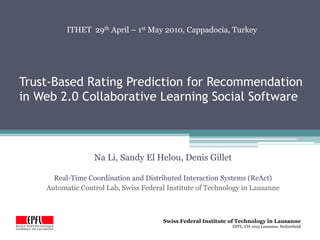
Trust-Based Rating Prediction for Recommendation in Web 2.0 Collaborative Learning Social Software_Na Li
- 1. ITHET 29th April – 1st May 2010, Cappadocia, Turkey Trust-Based Rating Prediction for Recommendation in Web 2.0 Collaborative Learning Social Software Na Li, Sandy El Helou, Denis Gillet Real-Time Coordination and Distributed Interaction Systems (ReAct) Automatic Control Lab, Swiss Federal Institute of Technology in Lausanne Swiss Federal Institute of Technology in Lausanne EPFL, CH-1015 Lausanne, Switzerland
- 2. Outline • Introduction • Collaborative Learning Domain • 3A Interaction Model • Trust-Based Rating Prediction Approach • Evaluation and Results • Conclusion and Future Work Swiss Federal Institute of Technology in Lausanne EPFL, CH-1015 Lausanne, Switzerland
- 3. Introduction • Web 2.0 social software ▫ A large amount of user generated content ▫ New challenge: selection of useful resources RSS Feeds Pictures Pictures Wiki Pages Documents Videos Swiss Federal Institute of Technology in Lausanne EPFL, CH-1015 Lausanne, Switzerland
- 4. Introduction • Rating systems ▫ Evaluate quality of content in open environment ▫ Provide recommendation for different users Swiss Federal Institute of Technology in Lausanne EPFL, CH-1015 Lausanne, Switzerland
- 5. Introduction • Rating systems – application level Epinions 1 to 5 stars A set of aspects for shops and products (ordering, delivery, service) Status for members (Advisor, Top reviewer, Category Lead) ePractice.eu Use “Kudos” to measure the activity of members Award a number of “Kudos” according to each user action Everything2 “Positive” and “Negative” votes for articles Users’ ranking according to their contribution • Rating systems – academic research level ▫ TidalTrust (J. Golbeck), MoleTrust(P. Massa) ▫ User explicitly specifies a trust value towards another user ▫ Build trust network, Random walk in trust network ▫ Personalized rating prediction Swiss Federal Institute of Technology in Lausanne EPFL, CH-1015 Lausanne, Switzerland
- 6. Collaborative Learning Domain • Collaborative learning environment ▫ Unlike e-commerce and review sites ▫ Gift economy • Rating systems ▫ Evaluate user generated content ▫ Filter helpful learning resources, peers and group activities ▫ Personalized rating prediction for recommendation Swiss Federal Institute of Technology in Lausanne EPFL, CH-1015 Lausanne, Switzerland
- 7. 3A Interaction Model Swiss Federal Institute of Technology in Lausanne EPFL, CH-1015 Lausanne, Switzerland
- 8. Trust-Based Rating Prediction Approach • Objective ▫ Build users’ trust network using 3A graph structure ▫ Personalize the rating prediction ▫ Infer trust value in an implicit way • Basic idea ▫ What influences rating opinion: similarity and familiarity ▫ People tend to trust the opinions of acquaintance and those having similar interests and tastes. Swiss Federal Institute of Technology in Lausanne EPFL, CH-1015 Lausanne, Switzerland
- 9. Trust-Based Rating Prediction Approach • Trust measurement ▫ Multi-relational trust metric ▫ Build a “Web of Trust” for a particular user using heterogeneous types of relationships • Trust Inference ▫ Direct trust ▫ Indirect trust Trust How Much? Swiss Federal Institute of Technology in Lausanne EPFL, CH-1015 Lausanne, Switzerland
- 10. Trust-Based Rating Prediction Approach • Direct trust (DT): derived from a particular type of relationship Is Member of Advanced Alice Algorithms Group Activity W (Membership): weight of “membership” relationship N (Alice, Membership): number of group activities Alice joins Swiss Federal Institute of Technology in Lausanne EPFL, CH-1015 Lausanne, Switzerland
- 11. Trust-Based Rating Prediction Approach • Trust propagation Bob • Propagation distance (PD) ente d by m Com Rated by e Article Sara Creat Is Member French Has Member Alice Learning Luis Activity Rated by Video Ben Jack Propagate Propagate Propagate PD Swiss Federal Institute of Technology in Lausanne EPFL, CH-1015 Lausanne, Switzerland
- 12. Trust-Based Rating Prediction Approach • Indirect Trust (IT) Inference Swiss Federal Institute of Technology in Lausanne EPFL, CH-1015 Lausanne, Switzerland
- 13. Trust-Based Rating Prediction Approach • Rating prediction from a user to an item ▫ Using user’s “Web of Trust” ▫ People in “Web of Trust” are seen as trustable ▫ Average of all the rating scores given by trustable people, weighted by their trust value Swiss Federal Institute of Technology in Lausanne EPFL, CH-1015 Lausanne, Switzerland
- 14. Evaluation and Results • Using Remashed data set ▫ 50 users, 6000 items, 3000 tags and 450 ratings ▫ “Leave-one-out” method ▫ Compare “predicted score – actual score” deviation of trust-based prediction and simple average Swiss Federal Institute of Technology in Lausanne EPFL, CH-1015 Lausanne, Switzerland
- 15. Evaluation and Results • Change parameters ▫ Weights for relationships doesn’t make a significant difference in rating prediction ▫ Increasing size of trust network might add noise, lead to bigger prediction error Swiss Federal Institute of Technology in Lausanne EPFL, CH-1015 Lausanne, Switzerland
- 16. Conclusion and Future Work • Propose a trust-based rating prediction approach, inferring trust in an implicit way • Provide personalized rating prediction so as to evaluate user-generated content in collaborative learning environment • Future deploy and evaluation will be conducted in a collaborative learning platform, namely Graaasp (graaasp.epfl.ch) Swiss Federal Institute of Technology in Lausanne EPFL, CH-1015 Lausanne, Switzerland
- 17. Questions? Swiss Federal Institute of Technology in Lausanne EPFL, CH-1015 Lausanne, Switzerland